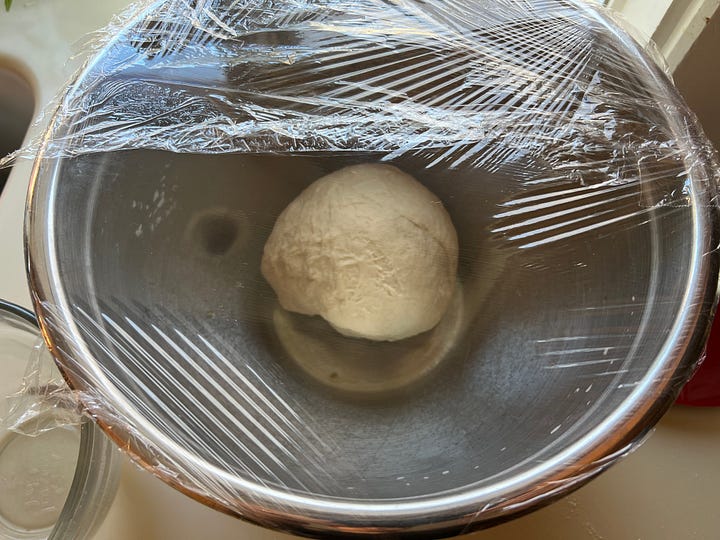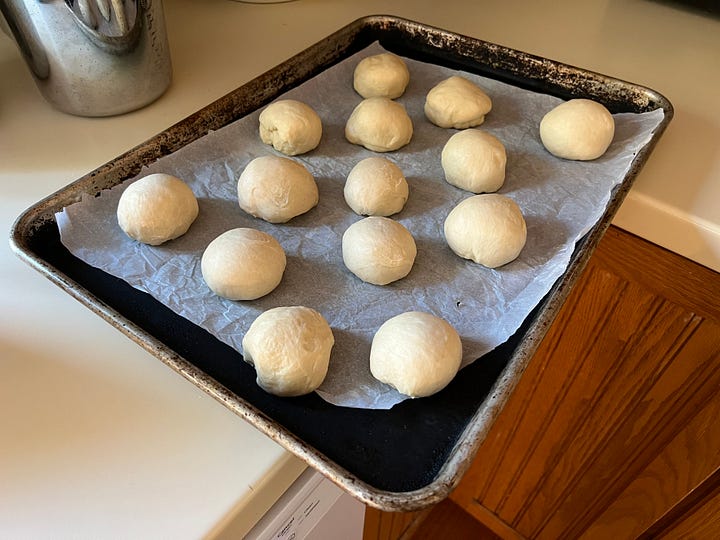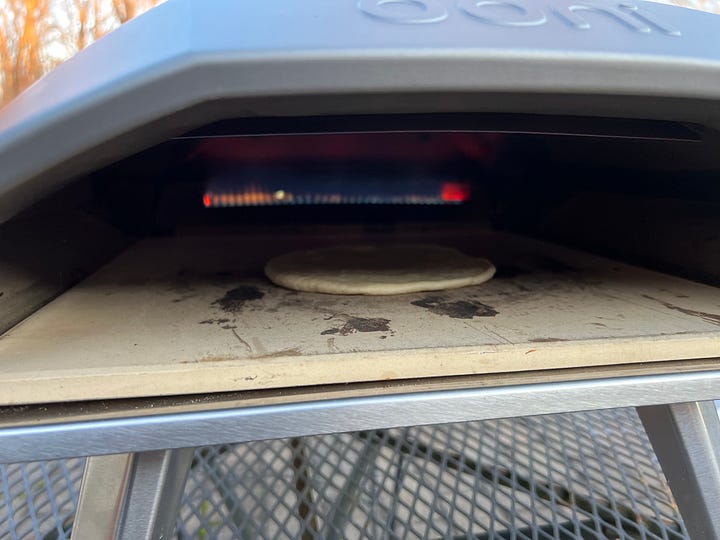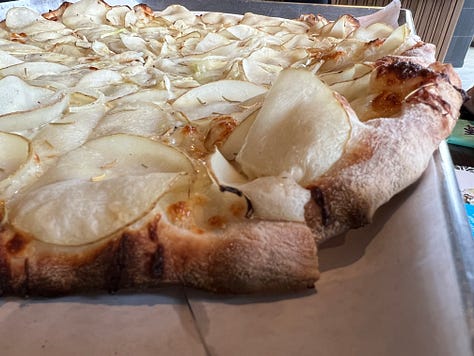How to Build a Sustainable Journaling Habit
A practice of daily alliterative reflection: Accomplishment, Anxiety, and Appreciation

Pretty soon the spring semester will be in full swing at Harvey Mudd (the first day of classes is next Tuesday). One of my favorite parts of being an academic is the rhythm of the academic year which provides seasons of busyness during the semester punctuated with slower times for reflection and rest. But, as I wrote a few weeks ago, reflection is a tricky thing because we often feel that it is somehow inauthentic to schedule reflection. However, the exact opposite is true.
This week, I want to share this year’s prototype: building a daily habit of reflection with journaling.
I've tried a few times in the past to consistently journal but it has never stuck. But I have a feeling that this year I will be more successful by leveraging James Clear's framework for making a habit stick from Atomic Habits: make it obvious, make it attractive, make it easy, make it satisfying.
The Triple-A Framework: Accomplishment, Anxiety, and Appreciation
The framework that I am using is inspired by one of my favorite Twitter follows of 2022, Sahil Bloom. Last week, Sahil tweeted his 1-1-1 Method for journaling. In essence, the method boils down to responding to three prompts each day. While I'm adopting his method, I've tweaked the language to make it a little stickier:
Accomplishment - what's a win from the day?
Anxiety - what's something you're worried about or a point of tension?
Appreciation - what is something or someone you are grateful for?
At the end of every day before I head to bed, I sit down with my Pilot Metropolitan fountain pen and notebook and jot down a few sentences in response to these three prompts. Here’s why I think each of these prompts is worthwhile.
1. Accomplishment
An important part of making progress is noticing where you're taking steps in the right direction, even if they're small. Taking note of the small wins helps to keep you motivated and bring out those things that otherwise might fall under the radar.
This last week, I felt this in action as I celebrated the momentum of putting the finishing touches on my 4-year reappointment packet for work. Just recognizing that I was able to put some dedicated effort each day into writing and editing the packet helped me to reflect on the progress that I made and motivate me as I started the next day.
2. Anxiety
A lot of what can make anxiety crippling is that it is unnamed. What I like most about noting something that I am worried or feel tension about is that the process of externalizing it and getting it down on paper helps me to flush it out of my system. It might not materially change anything, but just having it out of my head and on paper in front of me somehow helps to make the problem seem more tractable.
This past few weeks a lot of the tension I felt was the result of traveling, jet lag, and the sickness that always seems to come along with it. When kids aren't sleeping and noses are running its easy to feel tension. But putting writing it down helped me to put things in perspective and avoid having it monopolize the trip.
3. Appreciation
Let's face it, life is hard. And when a lot of what is in front of our eyeballs all day is intended to make us angry and play on our negative emotions, it can be hard to recenter ourselves in a mindset of gratitude.
I am always struck by my lack of gratitude on the days after I recover from being sick. Health—physical, mental, emotional, and otherwise—is so easy to take for granted. The practice of jotting down a few words or sentences to note what you appreciated in a given day is a great way to maintain perspective on all of the good things we have in life.
The Compounding Benefits of a Daily Habit of Reflection
While the year is yet young, I'm feeling pretty happy with this new rhythm. While I think either a digital or handwritten format for your journal is fine, I've been experimenting with pen and paper so far. One potential advantage of doing it digitally in my favorite personal knowledge management tool Logseq is that I could go back over time and more easily resurface past reflections, but I'm not sure that advantage will outweigh the distraction- and screen-free format of my paper journal.
I'm also hoping that this daily practice of journaling will give me a window into my past with a level of granularity that I would otherwise not have. As I worked on my annual review questions from a few weeks ago, I noticed that there were parts of last year that were pretty opaque to me. I couldn't remember much from them. I'm hopeful that as I look back on this year, these three daily highlights can help to fill in the gaps and help me to be more present and thoughtful about my time.
As you ease into the new year and the shininess of any resolutions begins to dull, consider developing a "boring" rhythm of reflection and starting a Triple-A Journal.
Share Your Practice
If you already have a habit of journaling or are looking to build one this year, drop me a line! I’d love to hear what strategies you use and why you think journaling is a worthwhile endeavor.
The Book Nook
A few weeks ago I finished The Remarkable Ordinary by Frederick Buechner. This collection of essays ties together a series of reflections on the importance of each moment in life and how to open our eyes to see the way God is working in the mundane and regular of our everyday lives.
Below I’ve selected a few quotes that resonated with me.
Let us not be seeing but never perceiving and ever hearing but never understanding.
Listen for God, stop and watch and wait for him. To love God means to pay attention, be mindful, be open to the possibility that God is with you in ways that, unless you have your eyes open, you may never glimpse. He speaks words that, unless you have your ears open, you may never hear. Draw near to him as best you can.
I love this one. What does it mean to really see the people around us each day?
To love your neighbor is to see your neighbor. To see somebody, really to see somebody, you have to love somebody.
On the purpose and human need for art.
I think that what true art, and true religion, does at its best is to put each one of us in touch with that holy part of ourselves, with that source from which art and love comes, and from which all good, wise things come, so that we—by virtue of this painting, this poem, this ballet, this piece of music, this Scripture—become finally, truly, human at last.
Reflecting on a new way of thinking about prayer where we are honest with the deepest yearnings of our hearts.
She said the vision she had was of Jesus standing with his hands tied behind his back, unable to do anything because nobody dared ask him to do anything. She said, “Go ahead and ask for anything. Ask for healing, ask to be healed. Don’t worry about the little voice inside of you that says, It’s not going to happen or God doesn’t listen to things like that or How do you think you’re going to change God? Don’t worry about that little voice. Of course, that little voice is there. It’s a product of centuries of skepticism, doubt, and all that. Just drown it out with your prayers and pray for miracles.”
The Professor Is In
The 4-year reappointment packet is in! We’ve recently revised the pre-tenure review schedule at Mudd, but when I started we were on a three-review schedule with two checkpoints before the tenure review. I’ve now submitted my materials for the second review, with a focus on a what I’ve been working on over the past two years.
I also wanted to share one of the Substack newsletters that I’ve most been enjoying lately. Intentional Academia is a new newsletter written by Robert Talbert and I appreciated his reflections in his first post this week. Check it out below if you’re interested!
Leisure Line




For Christmas this year my father in law got an Ooni Koda 12 pizza oven. If you’ve been around the newsletter for any period of time you’ve seen some of my pizza, but I’ve been branching out a little lately and this week I tried a new Naan recipe. I’ve done pita a few times before, but this recipe was hands down the best bread yet.
Still Life



When in Connecticut, eat New Haven-style pizza. Hit both Pepe’s and Sally’s this trip and wow—always so good. Now if only I can get my Sally’s shirt to put in the rotation with my Frank Pepe one.



Hi Professor. There are three times in my life when I was consistent about journaling. Two times were special long trips (38 days in Europe and 16 months on a bicycle), and the third was my first year or so of marriage. Outside of those times, I have struggled to be consistent. I am thinking of adapting the pattern you mentioned to see if that can help me keep it short and make it consistent. In fact, I may try to adapt this pattern to writing in general. In any case, I also intend to write in a notebook with a decent pen. My pen of choice is always one that I purchase on a trip to Japan. I could probably get similar pens back home (I'm in Japan right now), but I have never been disappointed with the quality of these very inexpensive gel ink pens that I discovered here a few years back. And so cheap! By the way, I really appreciate your book focus this time. I can relate to what you quoted.